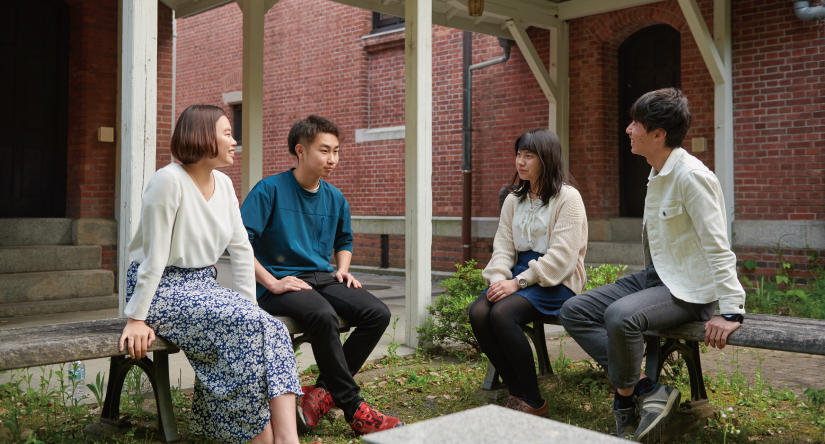Vol.16 Student Roundtable Discussion
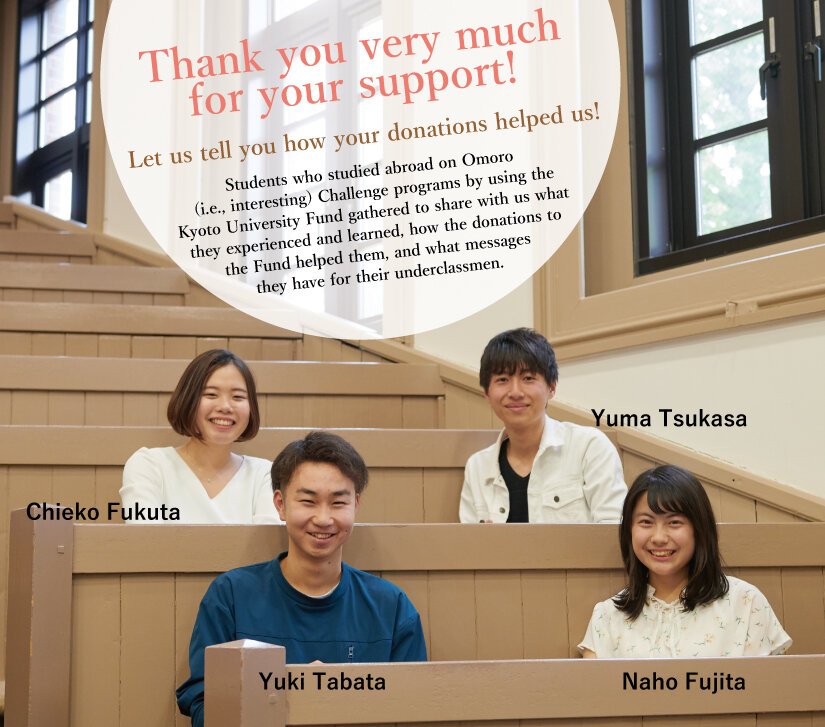
Mr. Yuma Tsukasa/4th year Faculty of Science
Selected based on the FY 2017 Student Projects for Enhancing Creativity (SPEC) contest
Can the human brain hear the sounds made by auroras?
Ms. Naho Fujita/4th year Faculty of Science
Selected based on the FY 2017 Student Projects for Enhancing Creativity (SPEC) contest
Can the human brain hear the sounds made by auroras?
Mr. Yuki Tabata/3rd year Faculty of Agriculture
Selected based on the FY 2017 Omoro Challenge screening
A study in Uganda: Finding out about international cooperation and its new possibilities
Ms. Chieko Fukuta/3rd year Faculty of Economics
Selected based on the FY 2017 Omoro Challenge screening
Examining female workforce participation in Taiwan from a food service industry perspective
-------- First, please tell us where each of you went and what you experienced.
Fujita I went to Alaska as a team of five, including Mr. Tsukasa, to examine the sounds believed to be made by auroras. Since nothing is currently known about the mechanism behind the possible production of sounds by auroras, we constructed and tested a hypothesis we call the direct perception theory. Our hypothesis holds that, although what our brain could be perceiving when auroras occur must not be sound waves, it could be electromagnetic waves generated by them. We succeeded in recording some sounds with a reasonable possibility of having been made by an aurora and have been studying them ever since returning. However, we have so far not reached any conclusion on whether they are the products of electromagnetic waves directly being perceived by our brain.
Tsukasa Despite my major being biology, I decided to pursue this research with Ms. Fujita and her teammates, who major in astronomy, because I thought I could help increase the team's chances of solving this mystery by offering a biological perspective. We hypothesized that molecules called cryptochromes, which exist in our brain, could be what is responding to the electromagnetic waves, or in other words, that the cryptochromes' potential to help us tell direction based on geomagnetism even while blindfolded could have something to do with this mystery. While we have not reached any conclusion yet, we did learn many new things through inspirational discussions with many people--foremost including Mr. Shunichi Akasofu, a leading aurora researcher at the University of Alaska--whom we likely would not have met had we led normal student lives.
-------- How are the prospects of your team's direct perception theory?
Tsukasa We analyzed our recorded sound data but could not verify whether the "sound" had indeed come from the aurora. We have also been conducting research into whether cryptochromes are able to respond to magnetic fields. However, a group of Tokyo University researchers just recently presented a paper confirming this as being the case. Therefore, we plan to shift our research toward investigating the underlying mechanism.
Fukuta Is it possible that humankind once had that sort of direction-telling ability but it atrophied since it became no longer needed due to advancements in technology?
Tsukasa That line of reasoning does exist. Such ability may have existed but became very weak.
Fukuta So, I could be right. Then, we may be able to hear aurora sounds by training that ability of ours.
Tsukasa That certainly is a possibility.
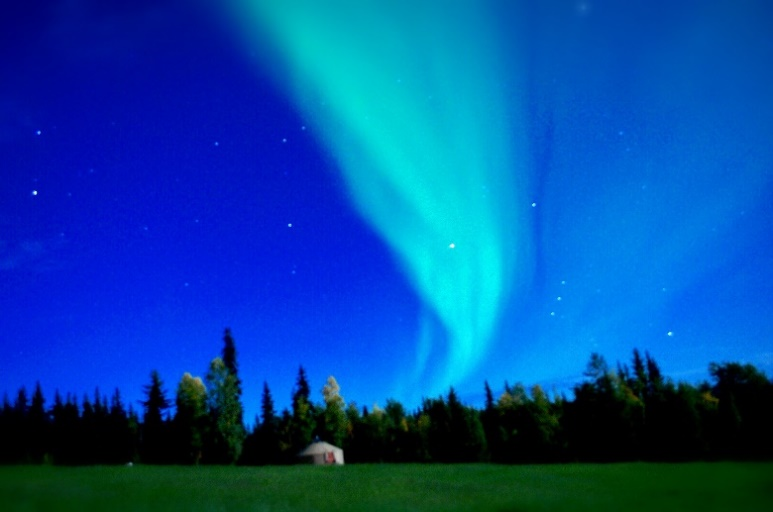 Our best aurora photo with the Orion in it, taken from our observation site in the wilderness of Alaska
Our best aurora photo with the Orion in it, taken from our observation site in the wilderness of Alaska
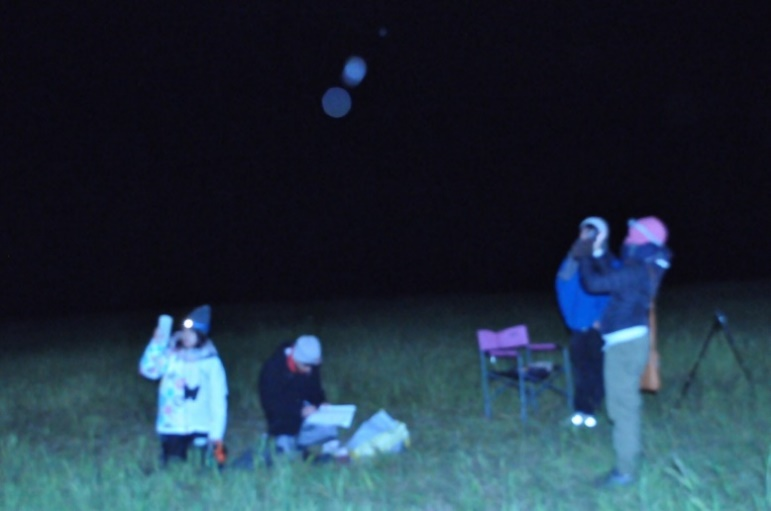 Us observing an aurora one night in September, which can get very cold with temperatures reaching below freezing
Us observing an aurora one night in September, which can get very cold with temperatures reaching below freezing
-------- Mr. Tabata, I understand you went to Africa to conduct your study in Uganda.
Tabata I first became interested in Africa during high school, when I saw a television celebrity visit Africa as part of a program called Konna tokoro ni Nihonjin (Why Would There Be a Japanese Person Living Here?). Subsequently, I entered college and learned of an NPO dedicated to helping Uganda from Kyoto. I immediately decided to do an internship there, which required describing its activities. While giving my description, I was asked whether I have been to Uganda. I never had, which realization kept bothering me. So, I decided to visit the country. However, I did not know that just the air ticket alone costed more than ¥100,000 and began to have second thoughts. That was when I learned of the Omoro Challenge. My theme was to observe international support and cooperation workers providing help and to speak with as many of them and those receiving help as possible. Ever since then, I have been extremely attracted to Africa (laughs).
-------- Was there anything that particularly impressed you?
Tabata I was impressed by the fact that international support workers at the aid sites were actually not working alone. There were many others collaborating with them by serving important roles remotely from each of their workplaces with today's advanced telecommunications networks. I used to think all I needed to do to be of some help was get myself to one of those aid sites, but I was wrong.
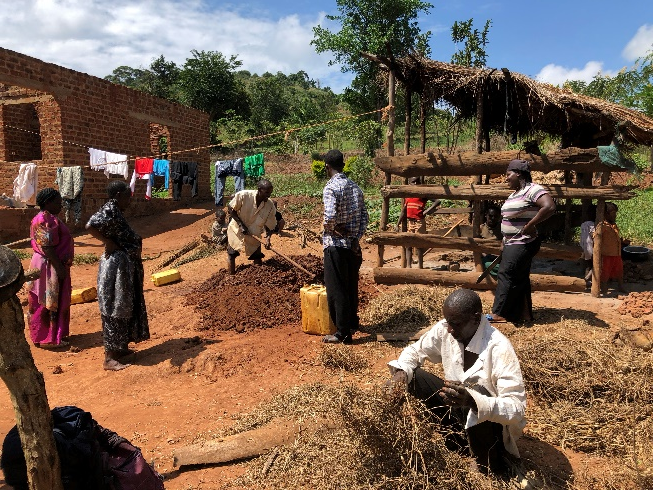 Community members building a furnace together
Community members building a furnace together
-------- Ms. Fukuta, I heard you used to live in Taiwan.
Fukuta Yes. I was brought up in Taiwan during my elementary and junior high school days for about four and a half years because my parents' jobs required us to move there. I notice that the Taiwanese did not cook at home as often as we would. Eating out seems to be a deeply rooted part of their culture. They have breakfast shops, where many people begin their day by eating out. Whereas in Japan we consider eating out as a luxury, in Taiwan, those that cook at home actually are the wealthy ones.
Fujita How did Taiwan's circumstances come to be like that?
Fukuta My hypothesis was that there must be a strong causality between Taiwan's female workforce participation and its food service industry. However, I could not find any definitive proof of such causality. Yet, while exploring the reason behind Taiwan's active female workplace participation, I noticed that the Taiwanese concept (i.e., culture) of housework greatly differs from that of Japan. In Taiwan, male and female housework roles are explicitly defined. For instance, cooking could be a female role, and vacuuming a male role. That helps Taiwanese women secure time to work outside the house. Then, why is eating out so popular in Taiwan? Possibilities include its active female workforce participation, low number of households with kitchens, low-cost food-service industry labor, and relatively low health awareness. However, I have not been able to confirm any of these possibilities yet.
Tsukasa Does Taiwan have gender wage gaps?
Fukuta No. None exist in most workplaces. Taiwanese women work as hard as their men do. So, gender discrimination is not tolerated. Living independently of men is so commonplace that, if anyone were to suggest something out of line, that person would be told, "I thought people like you were extinct by now."
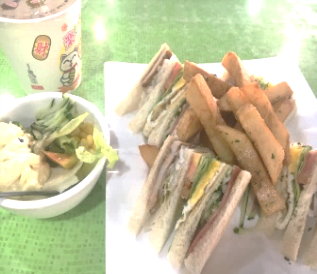 What I had for breakfast one morning at one of the local breakfast shops, which opened at 5 a.m. and was closed in the evening
What I had for breakfast one morning at one of the local breakfast shops, which opened at 5 a.m. and was closed in the evening
-------- How did each of you find our SPEC and Omoro Challenge support systems?
Tsukasa The SPEC contest requires submitting an elaborate research plan, which I found challenging to prepare. However, it was a good opportunity for me to learn how to formulate a logically structured research plan. I guess it makes a good exercise for those who want to become a researcher. The financial support I received, of course, greatly helped. In addition, I am equally grateful for the research opportunity the donor-funded SPEC program gave me, on which I never could have embarked without the program, because the opportunity introduced me to various people, who all expanded my view as a college student.
Fujita I think the SPEC program welcomes almost any theme submitted by highly motivated students, which aspect of it I found appealing.
Fukuta I agree. It financially supported our research project despite our plan being primarily based on inexperienced intuition, which I believe greatly reflects Kyoto University's generosity it always extends to its students.
Tabata My experience in Uganda helped me become a stronger person. I became able to use restrooms with flies flying around everywhere and also public transportation operated rather recklessly with cars not exactly in their best of conditions (laughs).
-------- Do each of you have a message for your underclassmen who may be interested in these support systems?
Tsukasa You may have never heard of these support systems since they may not exactly be widely promoted. Both systems are not overly demanding of results, so if interested, relax and just enter the contest or apply for the challenge.
Fujita You can experience what your life as a researcher would be like by writing a research plan for your application and a report on your findings and also train yourself for life after college through various other challenging experiences.
Tabata Other universities would likely not have support systems like these, so do not let them pass by easily. They are good ways for anyone who may be leading a lazy student life to get back on the right track.
Fukuta As students, we all need a challenge that could help us improve our value, build networks, and gain experience in the real world, and that is what the SPEC contest and Omoro Challenge present to us. Having the privilege to say "Kyoto University's Omoro Challenge program selected me" sometimes works as a passport to meeting people otherwise not easily accessible.
-------- Regardless of what challenge they choose to embark on, I know Kyoto University students have the power to enjoy challenges and produce good results, and I look forward to seeing them continue growing by inspiring one another. Thank you very much for your time today.
(Held in May 2019)
